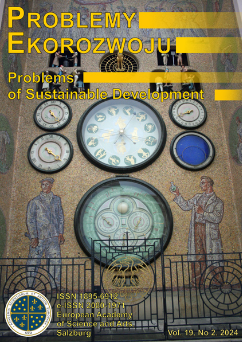Corporate Environmental Responsibility for a Sustainable Future
Pankojini Mulia
Department of Humanities and Social Sciences, Indian Institute of Technology (ISM) Dhanbad, Jharkhand-826004, India (India)
Ajit Kumar Behura
Department of Humanities and Social Sciences, Indian Institute of Technology (ISM) Dhanbad, Jharkhand-826004, India (India)
Sarita Kar
Department of Humanities and Social Sciences, Indian Institute of Technology (ISM) Dhanbad, Jharkhand-826004, India (Poland)
Abstract
It is an imperative to find a proper way to maintain a balance between the economic development and natural environment’s carrying capacity, which is needed for the wellbeing and sustenance of human as well as non-human world. Balancing the economic growth and environmental quality has always been a challenge for business. In recent years, business has brought immeasurable wealth and prosperity. However, it has also caused unintended environmental degradation. Economic development is necessary to face the need of growing population but it should not add to a deteriorating environment. There is a need for broader ethical responses for environmental sustainability. The search for a sustainable future requires an integration of economic development with ethical objectives and scientific knowledge. Sustainability is a concept of continuance, relationships, and orientations. The paper deals with three interrelated ethical concepts, (1) corporate moral status, (2) corporate moral status to include human beings, (3) corporate moral status to include natural environment as a path of environmental sustainability.
Keywords:
environmental challenges, environmental sustainability, corporate responsibility, corporate moral status, intrinsic and instrumental approach to the environmentAuthors
Pankojini MuliaDepartment of Humanities and Social Sciences, Indian Institute of Technology (ISM) Dhanbad, Jharkhand-826004, India India
Authors
Ajit Kumar BehuraDepartment of Humanities and Social Sciences, Indian Institute of Technology (ISM) Dhanbad, Jharkhand-826004, India India
Authors
Sarita KarDepartment of Humanities and Social Sciences, Indian Institute of Technology (ISM) Dhanbad, Jharkhand-826004, India Poland
Statistics
Abstract views: 23PDF downloads: 7
License

This work is licensed under a Creative Commons Attribution-ShareAlike 4.0 International License.




